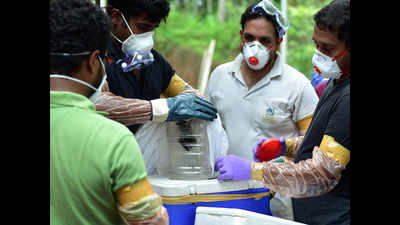- News
- City News
- kochi News
- Kerala looking at drug repurposing to find cure
Trending
This story is from May 24, 2018
Kerala looking at drug repurposing to find cure

Officials from Southern Regional District Diagnostic Lab capturing a bat from a well(File Photo)
KOCHI: State government is in touch with World Health Organization (WHO) and some of the leading researchers in the world to see if drug repurposing is possible. The aim is to know if a drug, already used to treat one disease, can be used in Nipah cases as well after tests prove its efficacy. At present there is no drug to cure Nipah virus. Though Ribavirin, an anti-viral molecule, has been found to be effective against Nipah virus, it is not curative.However, it has helped reduce mortality by 30%.
“We are in touch with WHO and leading researchers to see that molecules approved for compassionate use can be made available in Kerala for Nipah cases. We have also contacted Indian Council of Medical Research (ICMR) to see if the cases from Kerala can help develop a vaccine and a drug,” said health secretary Rajeev Sadanandan. On May 20, Kerala health minister’s office got in touch with a team of scientists in the US to see if drug repositioning is possible to treat Nipah virus. The best example of drug repositioning is Viagra that was first found to be useful in treating high blood pressure and angina (a chest-pain associated with coronary heart disease) and was later repositioned to be used for sexual dysfunction.
“Pharmaceutical companies have limited interest in investing millions of dollars to tackle a disease with low incidence rates. Drug repositioning is a sustainable drug stratification approach. We are using computational drug repositioning approach here and this would need further research. We are working on a strategy to release our data and findings at the earliest in the context of the public health emergency in Kerala,” said Dr Shameer Khader, program director (healthcare data science and bioinformatics) at Northwell Health, New York. He is part of the NiV drug repositioning team working closely with doctors from Kerala.”
For Nipah virus computational drug repositioning, they would be using gene expression data from a published report that used endothelial cells treated with NiV that is reported by scientists in Malaysia and France and perform ‘computational drug repositioning’ to find potential drugs that could be useful against NiV. The approach will be a therapeutic recommendation strategy and physicians will need to use their discretion for treatment.
“We are in touch with WHO and leading researchers to see that molecules approved for compassionate use can be made available in Kerala for Nipah cases. We have also contacted Indian Council of Medical Research (ICMR) to see if the cases from Kerala can help develop a vaccine and a drug,” said health secretary Rajeev Sadanandan. On May 20, Kerala health minister’s office got in touch with a team of scientists in the US to see if drug repositioning is possible to treat Nipah virus. The best example of drug repositioning is Viagra that was first found to be useful in treating high blood pressure and angina (a chest-pain associated with coronary heart disease) and was later repositioned to be used for sexual dysfunction.
“Pharmaceutical companies have limited interest in investing millions of dollars to tackle a disease with low incidence rates. Drug repositioning is a sustainable drug stratification approach. We are using computational drug repositioning approach here and this would need further research. We are working on a strategy to release our data and findings at the earliest in the context of the public health emergency in Kerala,” said Dr Shameer Khader, program director (healthcare data science and bioinformatics) at Northwell Health, New York. He is part of the NiV drug repositioning team working closely with doctors from Kerala.”
For Nipah virus computational drug repositioning, they would be using gene expression data from a published report that used endothelial cells treated with NiV that is reported by scientists in Malaysia and France and perform ‘computational drug repositioning’ to find potential drugs that could be useful against NiV. The approach will be a therapeutic recommendation strategy and physicians will need to use their discretion for treatment.
Even ICMR is also looking at other modalities of treatment – antibodies that can neutralize the problem. Meanwhile, WHO has developed a draft ‘Nipah R&D roadmap’ that prioritises the development of countermeasures to help Nipah-affected countries and invited comments on the same before June 8. “We are in process of strengthening National Institute of Virology (NIV) in Alappuzha. We have sent a full team from NIV, Pune to activate Alappuzha unit. The team arrived on Wednesday,” said ICMR director general, Indian Council of Medical Research.
End of Article
FOLLOW US ON SOCIAL MEDIA











